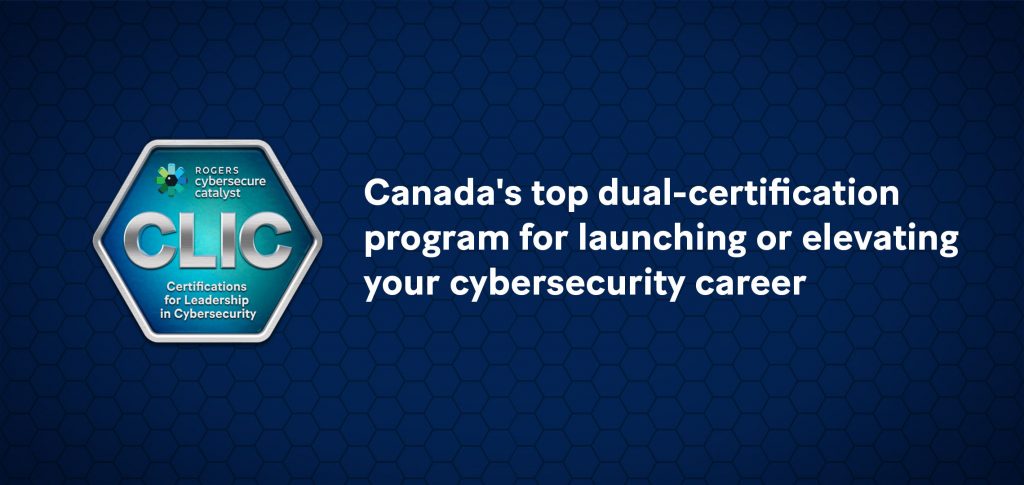Rogers Cybersecure Catalyst at Toronto Metropolitan University (formerly Ryerson University) offers innovative cybersecurity certifications designed to empower students to train to tackle the challenges of cybersecurity
Rogers Cybersecure Catalyst

Roxana Rozembaigher
Roxana Rozembaigher , Manager, Admissions, Recruitment and Community Manager, explained, “Rogers Cybersecure Catalyst is Toronto Metropolitan University’s national centre for training, innovation, and collaboration in cybersecurity. Headquartered in Brampton, Ontario, and offering programs and services across Canada, the Catalyst empowers individuals and organizations to seize opportunities and tackle the challenges of cybersecurity. Together with our partners and collaborators, we work to realize a vision of healthy democracies and thriving societies, powered by safe and secure digital technologies.”
“Our ground-breaking training and certification program, CLIC (Certifications for Leadership in Cybersecurity),” added Rozembaigher, “is Canada’s top dual-certification program for rising cybersecurity professionals. The most rigorous cybersecurity training program in Canada, CLIC offers individuals the opportunity to earn two globally recognized SANS GIAC certifications, hone their skills in the Catalyst Cyber Range, gain career mentorship from leading cyber experts, as well as connect with major employers in the sector.”
Diversity a Priority in Student Recruitment and Participation
“Our programs are all about bringing diversity to the cybersecurity industry,” began Rushmi Hasham, Director of Cybersecurity Training Programs. “We encourage people from all educational and professional backgrounds to apply because we need cyber defenders who are as diverse as the problems and attacks we are trying to solve.”

Rushmi Hasham,
More broadly, “The program is open to anyone with an interest in cybersecurity and looking for a rewarding and challenging career. We accept applications from both domestic and international applicants. The minimum criteria is a high school diploma and being 18 years of age or older. Most of our students are in their 20s or 30s and are transitioning to a second career in cybersecurity.”
Hasham added, “We bring awareness to the Catalyst programs by engaging with communities across the country. We collaborate with associations that focus on women, foreign-trained professionals, industry associations, corporations, governments, academic institutions, and public agencies to educate Canadians on how to tackle the challenges of cybersecurity. We also utilize digital marketing, host events, and webinars, and most importantly, leverage our wonderful alumni network.”
Rozembaigher shared the following training graduates stats:
- 68% self-identify as racialized
- 58% self-identify as women
- 92% have additional post-secondary education
- 60% come from technical backgrounds
- 75% have 5+ years of professional work experience
“We prioritize diversity, and our graduates have a broad variety of personal and professional experiences, which provides them with unique perspectives on cybersecurity threats,” summarized Rozembaigher.
Employment Support
The Catalyst also offers supports graduates in finding full-time employment in cybersecurity through its employment management team.
“CLIC students get access to our dedicated Career Support team who work with them throughout the program to choose a cybersecurity career path, build their resume, prepare for interviews, and land a job,” stated Rozembaigher. Support includes:
- Resume writing and critiquing
- Interview preparation and mock interviews
- One-on-one coaching
- Connection with employers
- Employer recruitment events
- Our large alumni network of cybersecurity professionals
“Since 2020, the Catalyst has trained over 500 cyber professionals who have gone on to work in more than 130 of the leading private and public sector organizations in Canada,” said Hasham.
“The Catalyst is a key source of top talent for many of the leading cybersecurity employers in Canada,” explained Hasham and suggested that gained skills allow graduates to work in a number of cyber roles, including:
- Cybersecurity Consultant
- Cloud Security Consultant
- Information Security Analyst
- Governance, Risk, and Compliance Analyst
- Network Security Analyst
- Cybersecurity Project Manager
- Security Awareness & Education Specialist
- Cybersecurity Technical Writer
- And other roles”
Business Connections
“Some of our employer partners are small businesses and our graduates have gone on to work for small businesses in cybersecurity roles,” remarked Hasham.
“In addition to our training program CLIC, the Catalyst also provides cybersecurity resources for small and medium-sized businesses through our Simply Secure platform.”
“Simply Secure is a Catalyst initiative offering high-quality resources and training to help small and medium-sized businesses grow a culture of cybersecurity within their organization,” stated Hasham.
“We share best practices and key insights to help businesses better understand cybersecurity risks, identify cybersecurity gaps, and build capabilities to mitigate vulnerabilities. Our goal is to help de-mystify cybersecurity by providing relevant information and actionable knowledge that you can easily and inexpensively integrate into your organization,” said Hasham.
The forerunner to The Catalyst was the Accelerated Cybersecurity Training Program (ACTP), I learned, which ran for four years and was supported by Government of Canada, Rogers Communications, and Royal Bank of Canada. “The ACTP was a resounding success – the Catalyst admitted close to 900 students into the program. Our mission has been fulfilled and, as a result, the ACTP is coming to a conclusion this year,” explained Rozembaigher.
Rozembaigher added, “Building on the success of the ACTP, CLIC is designed as a response to unprecedented demand for SANS-trained and GIAC-certified cyber professionals, as well as a vast cybersecurity labour shortage that currently sits at 3.5 million unfilled positions globally.”




